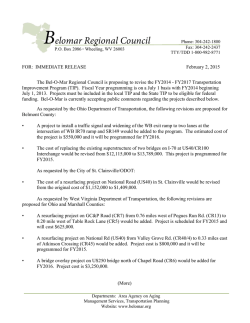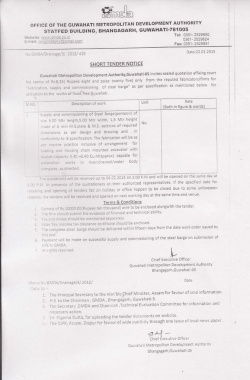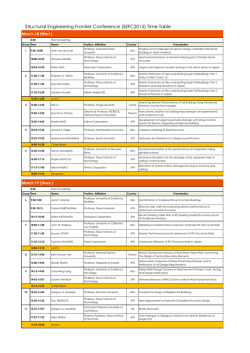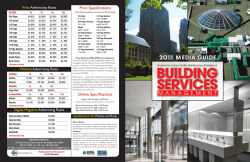
2015 STRUCTURaL EngInEERIng - College of Continuing Education
Photo used with permission from Press-Gazette Media 2015 Structural Engineering Seminar Series January 28, 2015 A Geotechnical and Structural Case Study: The Failure and Fix of Wisconsin’s Interstate 43 Leo Frigo Bridge Emergency February 4, 2015 Evaluating Structural Resiliency Through Codes, Continuing Education and Earthquakes, and Preservation Conference Center St. Paul campus University of Minnesota 1890 Buford Avenue Saint Paul, Minnesota Sponsored by: University of Minnesota College of Continuing Education Department of Civil, Environmental, and Geo-Engineering, College of Science and Engineering February 11, 2015 Seismic Design with ASCE 7-10 and the 2012 IBC February 18, 2015 Structural Steel Coatings and Finishes February 25, 2015 Advanced Diaphragm Analysis March 4, 2015 Lateral Load Design with Steel Joists and Joist Girders, Including Connection Design www.cce.umn.edu/structural This Structural Engineering Seminar Series is designed for practicing engineers and architects. Each program addresses specific structural issues, principles, and concerns in the design and construction of buildings, bridges, and other structures. The purpose of the Seminar Series is to • Provide current information on topics of interest to the structural engineering community; • Increase professionalism in structural engineering; • Provide a forum for continuing education in the engineering community. Seminar Schedule Wednesday, January 28, 2015 A Geotechnical and Structural Case Study: The Failure and Fix of Wisconsin’s Interstate 43 Leo Frigo Bridge Emergency A sag in the Leo Frigo Bridge in Green Bay was reported by a motorist. A bridge inspector from WisDOT arrived on scene and quickly determined a 400-foot span was sagging across all four lanes of the structure. Pier 22 of the bridge over land settled over two feet, resulting in the sagging of the bridge. A settlement of more than two feet is rare and many resources were involved in the findings. This presentation will reveal the cause of the failure, stabilization of the bridge, and permanent repair. Presenters: Scot Becker, P.E., M.S., Wisconsin Department of Transportation, Madison, Wisconsin Kent Zinn, P.E., S.E., Michael Baker International, Chicago, Illinois Scot Becker is the director of the Bureau of Structures at the Wisconsin Department of Transportation. As director, he leads the bureau which oversees program, policy, design, maintenance, and administration of the state’s transportation structures. He also serves as the state bridge engineer representative to AASHTO. He has been with DOT for 20 years and worked three years for a consultant prior to joining the department. He holds bachelor’s and master’s degrees in civil engineering from the University of Wisconsin–Madison and is a licensed professional engineer. Kent Zinn is a vice president at Michael Baker International with 20 years of experience in bridge design and project management. He has worked on projects throughout the Midwest including long-span river crossings and complex structures such as steel and concrete arches, box girders, bridge retrofits, and post-tensioned concrete. He is a National Highway Institute instructor who teaches LRFD bridge design courses to state DOTs nationwide. Moderator: Arielle Ehrlich, P.E. Wednesday, February 4, 2015 Evaluating Structural Resiliency Through Codes, Earthquakes, and Preservation Structural resiliency is a measure of a structure’s ability to withstand unusual load or exposure conditions. Designing to code minimums may expose structures to premature deterioration, extreme distress in earthquake events, and may jeopardize the longevity of historic structures. In this Seminar, structural resiliency is examined from several perspectives including going beyond the building codes, being aware of the performance of masonry buildings during extreme events, and preserving historic masonry structures. Examples will be taken from personal accounts of 9-11, the Christchurch Earthquake of 2011, and case studies of preservation. Presenter: David Biggs, P.E., S.E., Dist Member ASCE, Honorary Member TMS, Fellow ACI, Fellow SEI, Biggs Consulting Engineering, Saratoga Springs, New York David Biggs is a civil/structural engineer specializing in masonry, structural forensic engineering, and historic preservation. He was a member of the World Trade Center building assessment team following 9-11. He is an engineering lecturer on historic preservation at the University of Pennsylvania as well as in Prague and Iraq. Moderator: Jennifer Bean Popehn, P.E. Wednesday, February 11, 2015 Seismic Design with ASCE 7-10 and the 2012 IBC This seminar will provide an overview of the seismic design provisions of ASCE 7-10, Minimum Design Loads for Buildings and Other Structures, and the 2012 International Building Code that will be adopted in Minnesota in early 2015. Recent trial designs of seismic provisions have shown that practicing engineers have difficulty applying the seismic provisions of ASCE 7, and often get unconservative answers. This seminar will present lessons learned in recent seismic events and then examine the seismic provisions in the IBC and ASCE 7-10. A detailed example of seismic loads on an actual building will be presented. Presenter: Ed Huston, P.E., S.E., Smith & Huston, Inc., Consulting Engineers, Seattle, Washington Ed Huston is a principal in the firm of Smith & Huston, Inc., Consulting Engineers in Seattle, Washington. Ed Huston, a 1971 civil engineering graduate of the University of Washington, is a licensed civil and structural engineer in Washington and is licensed in seven other states. Ed chairs the General Engineering Subcommittee of the NCSEA Code Advisory Committee, is a member of the ASCE 7 Seismic and Main Committees, and is a member of the SEAW Earthquake Engineering Committee. Moderator: Mark Chauvin, P.E. Wednesday, February 18, 2015 Structural Steel Coatings and Finishes This elite panel will discuss four different applications of coatings/finishes applied to structural steel as well as the requirements necessary to obtain reliable performance for each. They will include a discussion of the requirements of traditional methods as well as recent developments for surface preparation, necessary criteria involved in the selection and application of high performance paint/coating systems, an examination of the hot-dip galvanizing process including ASTM specifications and best design practice, and an overview of UL’s Fire Resistive Directory and ASTM standards for fire testing steel structures and the application of both SFRM and intumescent fire resistive coatings. Presenters: Robert Berhinig, P.E., Berhinig Services LLC, Arlington Heights, Illinois Melissa Lindsley, American Galvanizers Association (AGA), Centennial, Colorado Heather Stiner, Society for Protective Coatings (SSPC), Pittsburgh, Pennsylvania Jennifer Zepeda, Sherwin-Williams, Burnsville, Minnesota Robert Berhinig has over 40 years of experience in the field of fire protection engineering related to fire containment in structures, fire testing, certification, and the development of fire test standards. Melissa Lindsley is the marketing director for the American Galvanizers Association (AGA). Ms. Lindsley serves as the voice for the North American hot-dip galvanizing industry in matters related to marketing, education, and technical assistance. Heather Stiner is the protective coatings professional for the Society for Protective Coatings (SSPC). Ms. Stiner serves as the staff technical expert on coatings, participates on the standards committees and the government affairs committee, as well as representing SSPC’s interests on various other industry groups. Jennifer Zepeda is the project development manager for Sherwin Williams. Ms. Zepeda works closely with engineers and owners to ensure the correct protective coatings specifications are in place for their projects. Moderators: Chuck Ashton, P.E.; Erika Winters-Downey, Regional Engineer for the American Institute of Steel Construction. Wednesday, February 25, 2015 Advanced Diaphragm Analysis Lateral force resisting systems in today’s structures are much more complex than they were several decades ago, incorporating multiple horizontal offsets in the diaphragms and shear walls, and large openings in the diaphragms. This presentation will provide a detailed review of a method of analysis that can be used to solve the transfer of forces across areas of discontinuity, and the analysis of flexible or semi-rigid wood sheathed or untopped steel deck diaphragms. Topics will include: • Method of analysis • Diaphragms with horizontal offsets • In-plane and out-of-plane offset shear walls • Diaphragms with openings Presenter: Terry Malone, P.E., S.E., WoodWorks – Wood Products Council, Prescott Valley, Arizona Terry Malone is a licensed structural engineer in Washington, Oregon, and Arizona, and senior technical director of the Architectural and Engineering Solutions section for WoodWorks-Wood Products Council. Prior to joining WoodWorks, he was a principal in consulting structural engineering firms in Washington and Oregon and also conducted third-party structural plan reviews. He also served as a faculty member at St. Martin’s College in Lacey, Washington. Terry has over 35 years of structural design experience and has taken an active role as a presenter providing seminars at state and local ICC chapters and professional engineering organizations with focus on understanding lateral force resisting systems. Terry is author of The Analysis of Irregular Shaped Structures: Diaphragms and Shear Walls, published by McGraw-Hill and ICC. Moderator: Lynn Brekke, P.E. Wednesday, March 4, 2015 Lateral Load Design with Steel Joists and Joist Girders, Including Connection Design The first part of this seminar will consist of a discussion of various lateral load systems as they pertain to the use of open web steel joists and joist girders; specifically, horizontal diaphragms, vertical and horizontal bracing, and rigid frame systems. The second part of this seminar will be a discussion and demonstration of the Steel Joist Institute’s SPREADSHEET for the design of moment connections for joist girder rigid frames. Participants may download the SPREADSHEET and Reference Manual prior to the seminar under the Tab “Steel Tools” at the SJI website: www.steeljoist.org. Presenter: James Fisher, Ph.D., P.E., Distinguished. M. ASCE, Vice President Emeritus, CSD, Estero, Florida Dr. Fisher received his B.S. in civil engineering from the University of Wisconsin and his M.S. and Ph.D. from the University of Illinois. Dr. Fisher served in the U.S. Army Corps of Engineers from 1962 through 1964. He taught at the University of Wisconsin-Milwaukee from 1968 to 1973. From 1973 until his retirement in 2008 he was vice president of CSD in Milwaukee, Wisconsin. Moderator: Theodore Galambos, Ph.D. Planning Committee Gene Anderson University of Minnesota Jeffrey Gutzmann, P.E. Xcel Energy – Transmission Engineering William Arockiasamy, P.E. Engineering Evaluations, Inc. Keith Jacobson, P.E. VAA, LLC Chuck Ashton, P.E. Consultant Jihshya J. Lin, P.E. MnDOT Bridge Office Lynn Brekke, P.E. Le Pas Design, Ltd. Lauren Linderman, Ph.D. University of Minnesota Ethan Charpentier, P.E. Larson Engineering Daniel Murphy, P.E. Meyer, Borgman & Johnson, Inc. Stephen Clark, P.E. Ericksen Roed & Associates Jennifer Popehn, P.E., Ph.D. Target Mark Chauvin, P.E. Wiss Janney, Elstner Associates, Inc. Tim Rapoport, P.E. TKDA Arielle Ehrlich, P.E. MnDOT Bridge Office Gordon Reigstad, P.E. Reigstad & Associates, Inc. Kristi Fischer University of Minnesota Katherine Russell, P.E. BKBM Engineering Nicole Freese University of Minnesota Jon Wacker, P.E. HGA Architects and Engineers Theodore Galambos, Ph.D. University of Minnesota Ken Walerius, P.E. Permasteelisa Cladding Technologies, Ltd www.cce.umn.edu/structural The University of Minnesota shall provide equal access to and opportunity in its programs, facilities, and employment without regard to race, color, creed, religion, national origin, gender, age, marital status, disability, public assistance status, veteran status, sexual orientation, gender identity, or gender expression. This brochure is available in alternative formats. Disability accommodations are available upon request. Please call Nicole Freese 612-624-3708. Series Location/Time Seminars will be held at the Continuing Education and Conference Center, 1890 Buford Avenue, University of Minnesota, St. Paul campus. All seminars will be held on Wednesday from *1:00 – 4:15 p.m.; seminars include a 15-minute break. *Please note start and end times. Parking is available in the parking lot east of the conference center (S104 - $6.00/day), the State Fairgrounds parking lot (S108 $4.00/day), and the Gortner Avenue Ramp (an hourly rate). Payment can be made by credit card or cash (no checks). More parking information can be found at: www.cce.umn.edu/conferencecenter Registration The fee for the entire series is $420. Please register by mail or fax to receive the series discount. The six-session discount is only available for one individual participant, not multiple participants. The fee for each individual seminar is $80. Fees include tuition, instructional materials, and refreshments. Refunds, minus a $30 processing fee, will be issued if cancellation is received in writing at least five business days before the date of the seminar. Refunds will not be issued to participants who have signed up for the entire series but miss individual seminars. The University of Minnesota reserves the right to cancel seminars if necessary, in which case a full refund will be made. Continuing Education and Conference Center 1890 Buford Avenue, St. Paul, MN 55108 612-624-3275 1-888-501-2268 www.cce.umn.edu/ConferenceCenter Continuing Education Units Each seminar session awards .3 CEUs. The entire seminar series awards 1.8 CEUs. One CEU is defined as 10 contact hours in an organized continuing education activity under responsible sponsorship, capable direction, and qualified instruction. These seminars are acceptable for continuing education credit with the state of Florida and New York. You will need to provide your Florida Professional Engineer License Number for Florida credit. For Registration Questions: Contact: 612-625-2900 or [email protected] For Program Information: Contact Nicole Freese, 612-624-3708 or [email protected]. Registration 2015 Structural Engineering Seminar Series January 28, February 4, 11, 18, 25, and March 4 Please print or type Last Name First Name M.I. Company/Institution January 28 A Geotechnical and Structural Case Study: The Failure and Fix of Wisconsin’s Interstate 43 Leo Frigo Bridge Emergency Event ID 188761 Title/Position E-mail Work Address (Street) City StateZip Daytime Telephone Please mark amount enclosed or amount to be billed. $80 per session X _______ sessions = $______________ I am registering for all six sessions (registration form must be mailed or faxed), $420 total due The six-session discount is only available for one individual participant, not multiple participants. Method of Payment I have enclosed a check or money order payable to the University of Minnesota. P lease bill my organization (purchase order or letter of authorization attached). Please charge the amount indicated above to my VISA Please mark the session(s) you plan to attend: MasterCard Card Number American Express Discover Expiration Date February 4 Evaluating Structural Resiliency Through Codes, Earthquakes, and Preservation Event ID 188762 February 11 Seismic Design with ASCE 7-10 and the 2012 IBC Event ID 188763 F ebruary 18 Structural Steel Coatings and Finishes Event ID 188764 F ebruary 25 Advanced Diaphragm Analysis Event ID 188765 March 4 Lateral Load Design with Steel Joists and Joist Girders, Including Connection Design Event ID 188766 Signature of cardholder Name as it appears on card (please print) Total amount to charge Registration Register online for individual sessions at www.cce.umn.edu/structural Mail registration to University of Minnesota, College of Continuing Education Registration, 201 Coffey Hall, 1420 Eckles Ave., Saint Paul, MN 55108 Fax registration with credit card or purchase order to 612-624-5359 For registration questions call 612-625-2900 or [email protected] If your check is returned because of insufficient funds, closed account, or because you have made a stop payment request, you will be charged a check-handling fee of $20. The information on this form is private data, used to identify and locate you, obtain payment, and enable instructors to better know their audience. Name, address, and payment method are mandatory.
© Copyright 2026
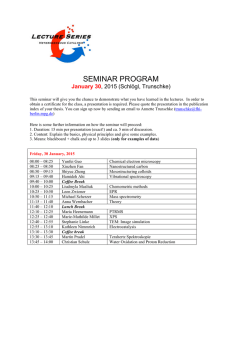
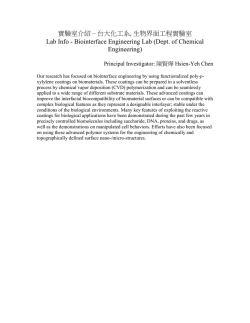
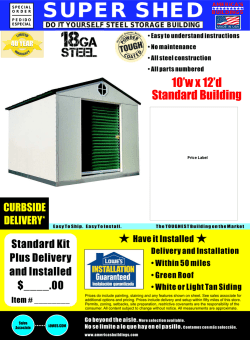
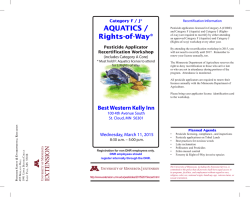
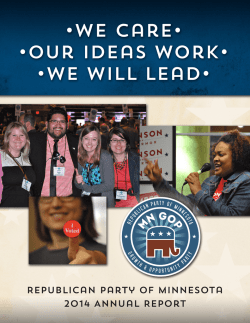
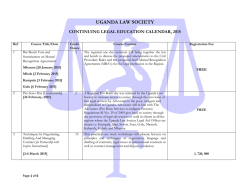
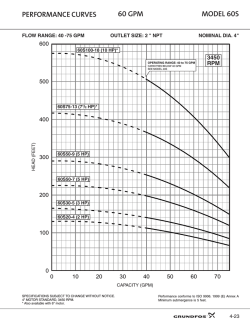
![Anthropology Seminar Series Spring 2015 [PDF 30.87KB]](http://s2.esdocs.com/store/data/000459047_1-7d84377bc849fc78a9376de82c187a04-250x500.png)
